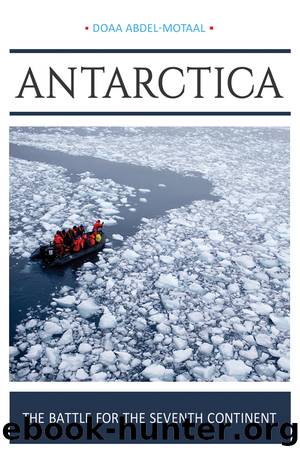Antarctica: The Battle for the Seventh Continent by Doaa Abdel-Motaal

Author:Doaa Abdel-Motaal [Abdel-Motaal, Doaa]
Language: eng
Format: epub
Tags: Non-Fiction, Law, Politics, History, Environment, Antarctica
ISBN: 9781440848049
Publisher: Praeger
Published: 2016-08-31T14:00:00+00:00
THE MOON AND OTHER CELESTIAL BODIES
The Moon Treaty was negotiated to create a more specific regime for the Moon than the Outer Space Treaty. Article 1 of the latter designates outer space, the Moon, and other celestial bodies as the âprovince of all mankind,â providing that their exploration and use be carried out for the benefit of all humanity, regardless of its degree of economic or scientific development. It stipulates that exploration and use by all states take place âwithout discrimination of any kind, on a basis of equality.â54 While the Outer Space Treaty made no direct mention of the Common Heritage principle, it clearly sowed the seeds for its subsequent arrival. Negotiated in parallel to UNCLOS, the developing world sought to embed the principle solidly into the Moon Treaty.
Initially, it insisted that a moratorium be placed on the exploitation of the Moon until a legal regime could be negotiated to govern its natural resources, with benefit-sharing arrangements with all of humanity at its core. This negotiating position made little headway, and it was not until a Brazilian compromise proposal succeeded in breaking the deadlock in 1979 that the Moon Treaty was concluded. Under this compromise, the developed world agreed that the Common Heritage principle would be interpreted as requiring the creation of an international regime to govern resource exploitation, in exchange for which the developing world renounced the imposition of an outright moratorium.55 However, the final wording of the treaty has been fairly ambiguous, leading many to conclude that a moratorium was indeed imposed.56
The key provisions of the Moon Treaty57 currently consist of Article 11(1), which clearly designates the Moon as the Common Heritage of Mankind; Article 11(4), which allows states to exploit and use the Moon without discrimination and on an equal basis; and Article 11(5), which commits states to âestablish an international regime ⦠to govern the exploitation of the natural resources of the moon as such exploitation is about to become feasibleâ [italics added]. Article 11(7) lists the principles by which this next regime would have to abide, with 11(7d) stipulating that the concept of benefit sharing, especially with the developing world, be given special consideration.
It is Article 11(5) in particular that has created ambiguity with its suggestion that an international regime needs to be negotiated âas exploitation is about to become feasible,â leading several industrialized countries to conclude that it had indeed imposed a moratorium, with the Moon negotiations starting to resemble UNCLOS. For them, the treaty had introduced a form of socialism through an absence of property rights, through the requirement that proceeds be shared with the developing world, and through the suggestion that an international organization needed to regulate mining on behalf of humanity. This would paralyze private enterprise and have a chilling effect on further space exploration.58 A report of the U.S. National Commission on Space concluded at the time that the Moon Treaty had introduced a collectivized international regime, analogous to the seabed mining regime, that would seriously inhibit U.S. enterprise in space.
Download
This site does not store any files on its server. We only index and link to content provided by other sites. Please contact the content providers to delete copyright contents if any and email us, we'll remove relevant links or contents immediately.
The Lonely City by Olivia Laing(4784)
Animal Frequency by Melissa Alvarez(4442)
All Creatures Great and Small by James Herriot(4294)
Walking by Henry David Thoreau(3938)
Exit West by Mohsin Hamid(3808)
Origin Story: A Big History of Everything by David Christian(3677)
COSMOS by Carl Sagan(3603)
How to Read Water: Clues and Patterns from Puddles to the Sea (Natural Navigation) by Tristan Gooley(3446)
Hedgerow by John Wright(3339)
How to Read Nature by Tristan Gooley(3314)
The Inner Life of Animals by Peter Wohlleben(3296)
How to Do Nothing by Jenny Odell(3287)
Project Animal Farm: An Accidental Journey into the Secret World of Farming and the Truth About Our Food by Sonia Faruqi(3207)
Origin Story by David Christian(3184)
Water by Ian Miller(3166)
A Forest Journey by John Perlin(3053)
The Plant Messiah by Carlos Magdalena(2913)
A Wilder Time by William E. Glassley(2846)
Forests: A Very Short Introduction by Jaboury Ghazoul(2823)
